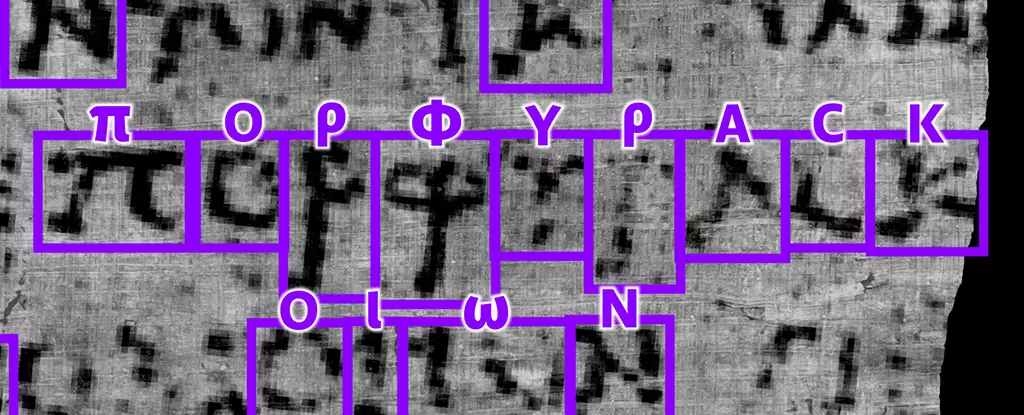After nearly 2,000 years of being buried under volcanic ash from Mount Vesuvius, the ancient Roman scrolls from Herculaneum have finally begun to reveal their secrets, thanks to the power of artificial intelligence (AI). Recently, scholars from the University of Kentucky initiated the Vesuvius Challenge, providing thousands of X-ray images of charred scrolls to be interpreted using AI technology. Excitingly, two students, Luke Farritor from the University of Nebraska-Lincoln and Youssef Nader from the Free University of Berlin in Germany, have successfully deciphered the first complete word from the scrolls using AI: “πορϕυρας” or “porphyras.” Purple, the English translation of the word, holds great significance in ancient Roman culture, often representing wealth and status. While the exact meaning of the word in the context of the scrolls remains uncertain, this breakthrough paves the way for further analysis and exploration of the rich historical information locked within these tantalizing fragments.
Farritor and Nader used distinct approaches to train AI algorithms to recognize and interpret the text. Farritor’s machine learning model focused on identifying a “crackle” pattern on the scroll, potentially indicative of ink strokes. As the AI algorithm detected more crackles and ink strokes, the dataset expanded, enabling it to detect additional patterns. Ultimately, the word “porphyras” emerged as a result. On the other hand, Nader’s approach involved training the AI to recognize shapes that resembled letters within the X-ray images. By exposing the AI to various letter patterns, it learned to identify the word “porphyras” and some adjacent letters. Importantly, these AI technologies can discern subtle variations in texture within the X-ray images, revealing hidden ink strokes, imperceptible to the human eye.
The discovery of this initial word fills scholars and researchers with great anticipation, as it represents just the beginning of unraveling the secrets of these ancient texts. The Vesuvius Challenge includes a grand prize of $700,000 for anyone who can successfully decipher at least four passages from these enigmatic scrolls. This challenge invites participation from individuals worldwide, encouraging a collective effort to uncover the wealth of information preserved within these invaluable artifacts.
The Herculaneum scrolls, buried after the eruption of Mount Vesuvius in 79 CE, remained hidden until the 18th century when workers stumbled upon the remnants of a luxurious villa. Believed to have once belonged to Lucius Calpurnius Piso Caesoninus, Julius Caesar’s father-in-law, these scrolls offer a unique glimpse into the intellectual and cultural life of the first century Roman Empire. Unfortunately, due to their fragile state, any attempts to physically open them would result in their disintegration. Therefore, the application of AI technology plays a vital role in preserving and extracting knowledge from these delicate artifacts.
The deciphering of the scrolls has far-reaching implications for historical research and our understanding of life in ancient Rome. If successful, AI and machine learning could unlock a treasure trove of lost knowledge about various aspects of Roman society. By reading the scrolls without physically unraveling them, scholars can access information regarding a wide array of topics, such as literature, philosophy, politics, and daily life in the ancient world.
The richness of the preserved text within these scrolls sparks curiosity and raises many exciting questions. How will this breakthrough in AI-assisted decipherment impact our understanding of history? Will the scrolls reveal the identities of their authors? Perhaps, hidden within their fragile pages, lies the untold stories of forgotten individuals and lost cultures.
The recent success in decoding the word “porphyras” from the Herculaneum scrolls illustrates the immense potential of AI technology in unraveling ancient mysteries. Luke Farritor and Youssef Nader’s groundbreaking achievements highlight the importance of interdisciplinary collaborations and innovative approaches to historical research. With ongoing advancements in AI and machine learning, the Vesuvius Challenge represents a significant step forward in our quest to understand and appreciate the richness of the past. By utilizing these technological advancements, we may unlock the secrets of the scrolls and gain invaluable insights into the lives of the people who lived over two millennia ago. The possibilities are vast, and with each new word deciphered, we inch closer to a more complete understanding of the ancient world.


Leave a Reply